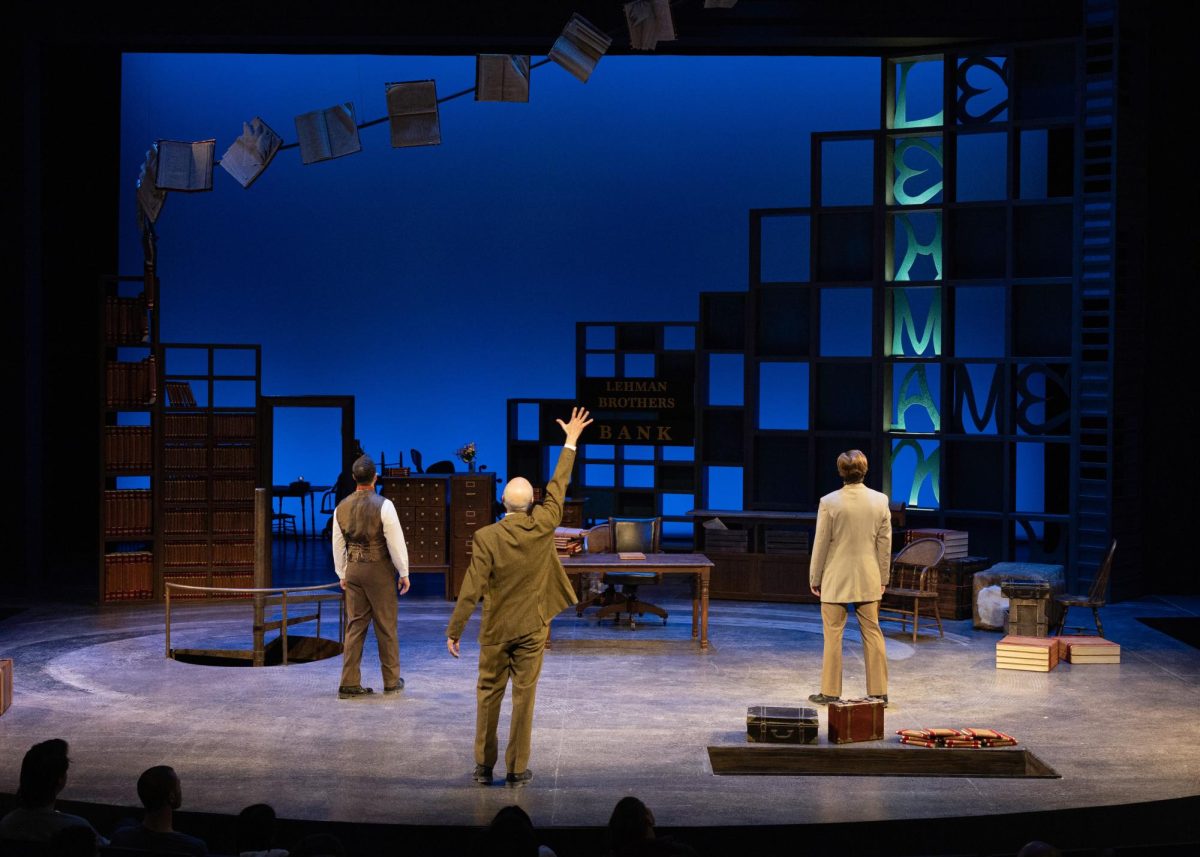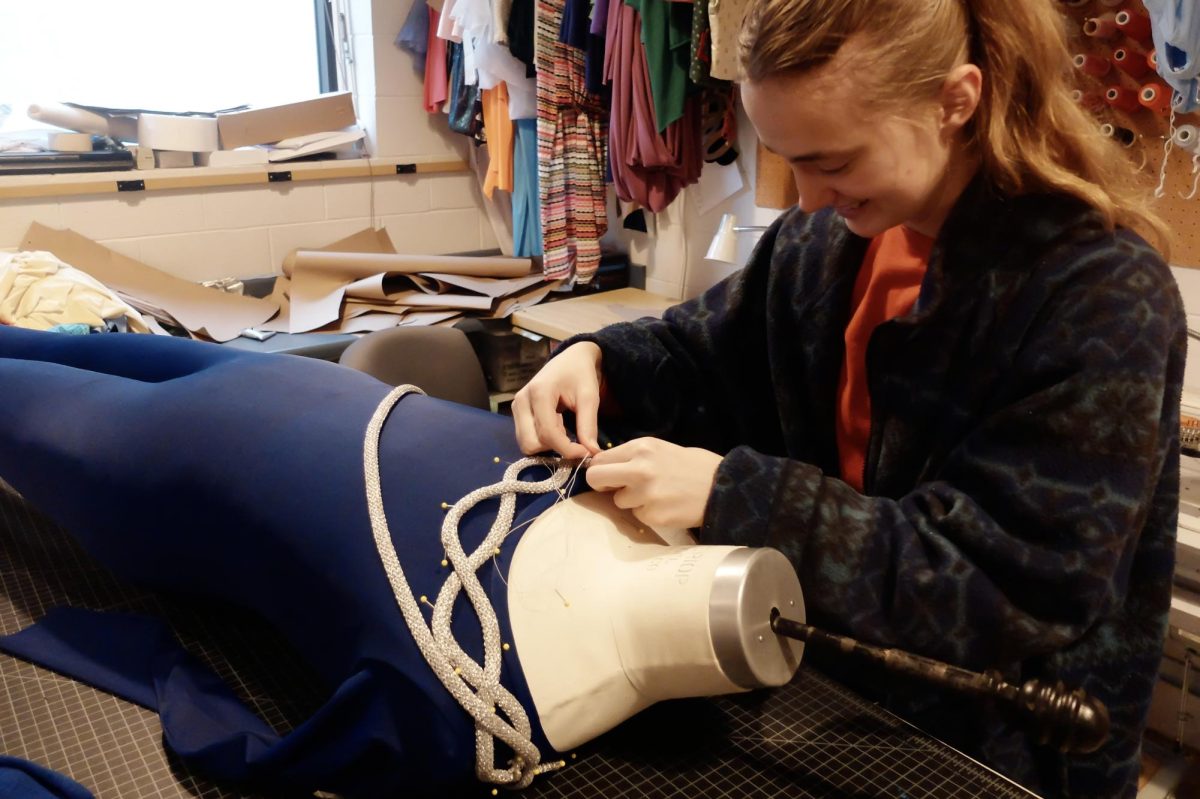In preparation for the upcoming production of “The Two Noble Kinsmen” through the Department of Theatre, I met with four of the student actors participating. The discussion included input from Brandt Garber, playing Arcite; Kali Scott, playing the Jailer’s Daughter; Ashley Ramos, playing Emilia; and Kelsey Jensen, playing Pirithous. Since this production is a translation of a Shakespeare text, we discussed the differences in approach, the play itself, and why audiences will still find the story relatable.
Tell me about the play on project and how that relates to this play.
Brandt Garber: It’s… as far as I know, it’s a reworking, a translation of all of Shakespeare’s works. They’re currently working on them, and they’ll be producing them at regional theatres, and we’re one of the first ones to do it.
Kali Scott: And it’s hosted by OSF, Oregon Shakespeare Festival.
Tell me about the play. What is it about?

Ashley Ramos: I really appreciate how we’re attacking it. Because on an initial read, it seems like it’s ridiculous, unrelatable, very outdated as well. But the way we’re attacking it is highlighting the youth, the obsession, and giving in to kind of the tragedy of it more than anything I think, more than other people have in the past. And just really trying to ground all of these seemingly outlandish stakes in very legitimate and valid human feelings that are just massively heightened in this epic world that we’re creating.
KS: The story has been around for a while. Geoffrey Chaucer wrote it down, then Shakespeare and Fletcher took it and added some elements and changed it. So then it’s Greek and Shakespearean and other stuff. It’s this mix of other cultures and stories and lines.
Kelsey Jensen: Another way we’re approaching it is because it’s based on war and fight and quarrel between the cousins, so we’re finding the love and the sense of unity. The cast feels really strong and really united because there’s a real sense of love within the show that I think we’re really bringing out, rather than focusing on the war or the fighting, or like the craziness of it all.
BG: The silliness.
KJ: Yeah, yeah.
AR: I think it’s also a different kind of love, because we’re grounding it with this warrior world. It’s like a very honorable camaraderie rather than a flighty love. It’s a very human to human….
BG: Visceral.
AR: Yeah, human kind of love.

So there seems to be this theme of honor that goes through the play. Is this concept of honor still applicable in our society?
BG: I’d say so. Just not to the extent it goes in the play. We’re hopefully not killing anyone over potential girlfriends or anything like that, but.
KJ: I think it’s cool because we wouldn’t — or maybe some people would, I don’t know — we wouldn’t go to those extremes like being willing to kill your family member for the love of a girl, but I think that it’s applicable because each one of us feels those extreme emotions, and reach those extreme levels of heightened jealousy and obsession, we just don’t physicalize it in the way that these characters do.
KS: I think that the honor like chasteness and virtue, it’s really alive in a lot of people. Also the honor for standing up for what you think is right. Like Palamon and Arcite stay behind and fight for Thebes even though they were about to leave. It’s not abandoning your people, or your country, or who you identify with. It’s standing up for a cause that matters to you. So I think that’s very applicable at this time.
BG: It’s kind of just respecting other people’s values, like Palamon and Arcite early in the play start going at it and talk about killing each other, and they’re not going to be able to get along because of this girl, but there’s still mutual respect for each other, and a code of honor. They still go about preparing this fight that they’re going to have in a civil and honorable way.
AR: I think at first the idea of honor seemed pretty foreign. Like we use the word so much in the text, like, “yeah, for honor,” but we don’t really know how much gravitas that has for us. What really helped was having Major Holt come in from the Marines and talk to us. He didn’t even articulate it any differently than any of our directors or professors or anybody, but even just watching his response when we asked, “What does that mean to you?” I just felt like it had so much weight in his own life and lifestyle, coming from a military world, that it then meant more to me as an actor trying to make that make sense to me as well.
Is this actually a feminist play?
KS: I don’t think it’s written as a feminist play, in the original version. Because both the girls, Emilia and Jailer’s Daughter, they talk about going crazy or having people perceive them as crazy, by the end, it’s like “oh, they’re insane” just because they’re emotional and have feelings, which I hate. So I don’t think the play was written as that. But I think that the way that we’ve constructed it and that Randy has looked at it, our version of the play….I don’t know if our play is feminist, but it’s certainly more feminist. The women are strong and grounded, they’re warriors, and they’re kind of victimized by this masculine, machismo society. So in that way, I think so. And I think we’ve found strength in some characters where Shakespeare did not have strength.

KJ: What it feels like to me is just, everyone feels really equal. I feel it with all the characters, but with my character especially. We’re approaching Pirathous as more androgynous, so it’s like, you can’t really tell which gender Pirathous falls under. So I think in a sense that is feminist because Pirathous is very strong, always talking about heroes and honor and fighting and goes to the wars and is right by the king’s side. But I also think that they’re very connected to Emilia. As Pirathous I feel a very strong connection to Emilia. I just see it as equal. I don’t really think that it leans more gender or another, I just think it all balances, in my eyes as my character it all balances out. It doesn’t matter to Pirathous.
AR: I absolutely agree with both of them. On an initial read, I was definitely like, this is very traditional, the women have no agency, you know what I mean? I think, that’s still something that I explore and I fight against. And I feel lucky that I’m directed in a way and exploring in a way where I can continuously fight for this agency even though the text and the circumstances don’t allow me to gain that agency by the end. I think that everything I put out into the world of the play is that fiercely active, powerful, and it’s just these swirling circumstances that don’t allow me to win. I also think we’re exploring it in this kind of genderless manner. So this obsession comes from the idea of love at first sight. And I love that we’re not playing it like “she’s so pretty” or “she’s so feminine.” They see Emilia, and I’m literally like, going to the gym in this garden. I’m pumping iron (laughs) on the set! And when I meet Arcite, it’s like I’m drawn to this situation, and it feels very strange to me because I feel like the characters are like, “Oh, I can match this person.” There’s no dominant or submissive relationship. These people are all powerful warriors, and when we feel like we can match someone…you are just as strong and honorable and brave and fearless.
BG: It’s like a cautionary tale. Not light lovey/dovey, Romeo and Juliet—well, not that Romeo and Juliet are that. But it’s about obsession and jealousy, and the consequences that come from that. There are some real terrible things that happen from it. Emilia is one of the only people who sees the absurdity of it and calls them out on it. Which is really cool to see.
On a similar note of insanity, there are some discussions as to whether or not the Jailer’s Daughter is actually insane or whether it is a truth telling technique. Is that something you have explored?

KS: Yeah, it’s something I’m definitely exploring in my work with her. And something that Randy has directed me to do is that she’s not actually insane. She’s just grieving so deeply and so suddenly—she’s fallen madly in this obsessive love, then she’s rejected, and then she thinks he’s dead. She goes through all this when she’s dehydrated and hasn’t slept or eaten. She hasn’t gone crazy, but her whole world has gone upside down. So the only way for her to cope is to go through these degrees of reality. She’s like, “Okay, actually he’s alive, and then I can cope with these other things that are going on, and then I can cope with him being dead later.” So she has to cope with these things in a stepwise motion in order for her to get over it.
Shifting gears a little—There is training specifically for Shakespeare built into the Actor Training Program, but since this project is technically a translation, how has that changed your approach?
BG: It’s easier! Well, I mean, it’s still all the same rules. It’s still in verse. It also helped because the first week we read it with the playwright who translated it, Tim Slover, and he was able to let us know what each line would mean if we had any trouble. But even then, this is so much simpler than Shakespeare usually is. I don’t want to say it erases a step, but it does quicken the process where you don’t have to maybe do your own translations and really dig deep to figure out what it means, it’s all laid out a lot more simply so you can just get into the other Shakespeare rules—the line endings, yadda yadda yadda.
KJ: I think it’s great because we just had Shakespeare class with Sarah Shippobotham last semester. It’s easier right away to understand what the text is saying, but it’s great because in Shakespeare you have to be so grounded and weighted in the words, and I think that still applies to this translation. You still have to have the same amount of connectivity, grounded-ness of the text, finding the weight of the words in your body, and not just skating on the surface, because I find myself doing that with contemporary pieces. Although, I guess the translation is contemporary, but it’s still so muscular and meaty, even though it’s in contemporary language.
BG: If no one had told me it was a translation, I just would think I was smarter than I am.

AR: I know! I’d be like, “They just made it so clear…” I guess the challenge of it is that it’s still heightened language and it’s still poetry, so it’s this weird combination of like contemporary language that is heightened even for today and still needs to be treated as verse and poetry. So I think that the breath work, the voice work, the thought tracking and the shifts all have to be the same as the way we learn when we’re trained in the original Shakespeare.
KS: It still feels very Shakespearean to me. I still had to translate my lines, because a lot of them she’s crazy, y’know, she’s just spouting stuff and Shakespeare’s like, “Now she’s gonna say this”; and I’m like, “Okay, what does this mean for her?” I have to ground this in reality, so I still had to translate. But in using the words, the shifts and all of that, it feels very Shakespearean, it doesn’t feel contemporary when I’m performing it.
I’ve heard that Randy has worked a lot to physicalize the war element. Can you tell me about that?
KS: We’ve been doing physical training every day since the first. And it’s honestly been kind of light, but it’s kind of a disciplinary thing as a group, doing it together, breaking a sweat, breathing heavy. It’s that…making your body feel like it’s stronger than it was at the beginning, feeling that strength and solidarity.
Why is that important to the cast?
KS: I think it’s necessary in a time of war, with soldiers.

BG: He was big on that kind of world, and we talked about we have no idea what that could have been like. So we came in with some of the physical training to give us some sort of idea, but there’s so much more to it. I think he wanted us to appear that we have been carrying that burden of going to war, what it does to you, physicality, everything else.
AR: I think also something that Major Holt talked about, and this is a total misquote of him, but just that whenever people suffer in a community or suffer together, it builds this camaraderie if you went through boot camp with your fellow marines, or whatever. And I love that feeling when we all go through it, do this daily physical training together because I think it’s an energy thing too. I am stronger because the whole group is stronger, and we’re all going to complete this together, and that’s how any show should feel, but especially this one when we need to find elements of military and this kind of epic/modern/Grecian feel. It feels so big. And it feels bigger than just doing a roll down to warm up.

KJ: This has been said before, but it unifies the cast. And if we think about it, the people who are country people in this play, the war is still there, it is still surrounding them, so they wouldn’t be immune or weak to that, they would still be strong and grounded in that. So I think it just gives everyone such a strong sense of groundedness within this war-torn world which is so important to the play because that’s what it revolves around.
KS: I also think that the play requires using your body to its fullest, testing it, and using it differently than you do every day, which every performance does, but I think especially Shakespeare and especially this world, it’s very different than our world so we need to know how to use our bodies differently and to its most efficient potential.
What has been the most challenging part up to this point in the process?
BG: For me, it’s all been really challenging, but it’s been really awesome to have someone like Randy directing, who is really encouraging to work really hard and dive in and have choices, even if they’re not right. It’s just kinda been one big challenge that I can’t really specify any one thing that has been more difficult than other things. It’s been a great cast and an awesome director, and the energy in the room really makes it worthwhile to persevere and push on.
AR: I think one of the biggest challenges for me was first initially figuring Emilia out. Because initially, I was like, “Why is she letting this happen? Why does this have to happen?” and figuring out how I as Emilia feel about all these different circumstances and I’m still juggling with, when is she a free-spirited wild woman, and when is she youthful versus when is she this warrior, versus when is she constrained as a court personality in a world she is not from, and when can I release into the grief and chaos of it. How hard do I fight against it? I think making sure that she is not seen as a victim is one of my biggest goals. And also, as an actor, connecting this heightened language to this intense physicality, and I think I can get a little sporadic giving into one more than the other, so finding the balance is really a challenge for me.
BG: I lied. I do remember one that’s really hard. The play, when you read it, is super ridiculous, and you’re like, this is hilarious, and these two characters are like, “I love you cousin,” and the next moment they’re like fighting each other. So immediately I was like, “Oh, this is hilarious!” and you want to play it ridiculous, almost. That’s something Randy has talked about, is that it won’t be funny if you think and try to make it funny, if you actually take these ideas and take them in, try to find the grounded, real, response to give it, and you stay true to the characters and the situations, the humor will come, whether or not it should. I think that was one of my biggest challenges, was not letting my preconceived ideas of this play and how I thought this should be funny and having it switch over.

KJ: I think mine has been similar to Ashley’s. My challenge has been trying to figure Pirithous out. I think Pirithous has such a wide array of emotions and how they take on the world and how they view the world around them. Because they’re so strong on war, honor, victory and goodness, so I guess I want to play it really strong and grounded. But they’re also so compassionate, because Pirathous has such compassion for Emilia and for Theseus, they really respect and honor Arcite and Palamon. So it’s been a challenge to be a strong warrior, but finding the love and compassion within others, and how that affects how they fight.
KS: I have a lot. It’s all surrounding the Jailer’s Daughter. The one thing is I spend the majority of my time on stage, being alone on stage. So how do I, as an actor, generate all the stuff going on inside her with no help, you know what I mean? But also, she thinks really differently than me, and I’ve been judging her a lot, and that’s hard, because I’m like, “Stop judging her! She’s not a stupid little kid, maybe you’re more similar to her than you want to admit, maybe that’s why you’re judging her.” So I’m really working to connect to her experience, and how can I present that in the most truthful, honest way that honors her without casting her in a bad light.

What are you most excited for people to see?
KS: The dance.
AR: The dance!
(laughs)
KS: There’s this fancy modge-podge dance. Which is also a challenge for me. But it will be fun. And it’s like, you can definitely see the comedy in it. Around all this tragedy, there’s some really funny stuff.
AR: I think the designs are killer. I’m excited to see them myself. I’m excited for anyone who has had a preconceived idea of this story to come see it, and hopefully feel very changed and feel differently. Maybe it will help people read classical works in a different way, so people don’t feel so stuck. Like, “it’s so quote/unquote traditional that it’s no longer relatable.” I hope we can make that happen.
BG: I’m excited for them to see the world that we’ve made. Like, the things that we won’t get to fully see or understand, like the transitions, we’ll never know because we’re in it, and hopefully, see if people like it or not.
KJ: Mine is the same as Ashley’s; I’m really excited to see people. I want people to come in with preconceived notions about Shakespeare, and I want those ideas to be broken.
What are the relatable parts of this play?
BG: Threatening to kill your cousin.
(laughs)
AR: Being an Amazonian. Obviously.
KS: I think falling in love for the first time, and feeling so overwhelmed by that, and thinking that’s the end all be all. And then you meet someone else and you’re like, “Oh, wait. What was I doing?” And I also think familial love, and for my character especially, leaving everything you know behind because you think you deserve something better, and then getting rejected from that life, and realizing maybe you had what you always wanted before, and it wasn’t really all that bad.

AR: I agree. I think the youthful sense of very intense love. Something that Randy said during our early table reads was that if you’ve never been in love and it’s not happy, it makes you sick, like “I’m in love and I feel like I’m going to throw up everywhere” then you will. I think that our show gives into that gravity, where a lot of… I don’t know a lot of people who give into that in their daily lives, but I know that those feelings exist. And that we can’t release those feelings because we have to be normal, sane human beings and go about our regular lives. I feel like, not until the very end, maybe, does any character every stop trying to figure a way for a better life or a better outcome. I feel like no one ever gives in or gives up. Even at the end, we get this wonderful epilogue, and I think it’s a major energy shift that’s helpful. I think that fight and marathon of trying to find different routes to a better outcome for yourself and those around you is really relatable.
So if you had to convince us to come see the show in one sentence or less, what would you say?
BG: You have no idea. (laughs) If you like Shakespeare, I think there’s a lot of traditional elements of that in here, if that’s what you’re into, if not, it’s one of the most approachable ways for someone who’s not well-versed in Shakespeare. No pun intended.
KS: It has blood. It has tears.
BG: Yeah it does.
KS: It has love. It has everything you need. And it’s totally just a story of growing up. I think the majority of characters are pretty young, and they’re all struggling to just, grow up. It’s hard to say, it’s just. They’re trying to live the best lives they can, so they’re doing these things, and they’re presented with conflicts and people telling them what to do, and, “I’m not going to do this, but I have to do this,” and they’re struggling to find where they fit in the world, like, how they’re going to continue their lives. And these moments go on to define them for the rest of their lives. That we never get to see.
AR: I love that. I think our show is very epic, and also very simple. I love the simplicity of this is a play about growing up. I think you’ll see that, and you’ll see parallels between Emilia and the Jailer’s Daughter specifically, and the coping with growing up, and for us, also becoming women specifically.
KS: Yeah.

Does the play prioritize love or honor?
BG: Honor. Honor. Definitely honor. There’s a lot of love in it too. I feel like I’d give away the ending even though it’s a super old play, but. I feel like if it was more about love, we’d see Emilia and Arcite hanging out and their relationship, but it’s more about Palamon and Arcite and their relationship. And yeah, it’s the quarrel that they have with each other and that conflict, but the honor that they have for one another, and trying to get through this problem that they have yet still remaining friends. And with other characters like Theseus and Pirathous. Both are present in the play, but if you had to pick one that would be mine.
KS: I think it’s about love. Also for my character.
BG: That’s a good point too.
KS: It’s still about Palamon and Arcite. At the end, the play kind of says, “Man. They sure loved each other. It’s really stupid what they did. The way this ended is not how it should have ended.” So I think it’s more about love and being around the people who make you happy.
KJ: I agree, I think it’s about love, and I think in that love is where the honor lies. And honor comes out through the characters for each other, but even Palamon and Arcite are doing such a silly thing, but they’re doing it for love because they also love Emilia.
AR: My initial answer was going to be honor. Because I was thinking specifically about Emilia, and I was thinking she’s not in love. She doesn’t love. This isn’t about her actually falling in love with anyone. Or having her say “I can just pick one! And love them! Valid.” I think that choice, that rocketing back and forth for however many scenes, is about being honorable and trying to save someone’s life. “I will love them back!” I don’t know them. I think it’s about love because I think a possible thesis line for this play is dear love bought with dear love’s loss. In the end, we might fool ourselves into thinking it’s about honor this whole time, and realizing the greater force underneath this whole time was love. Not your typical romantic love that you might assume the story is about. For me, at least.
B: Guess I’m quite the fool.
















